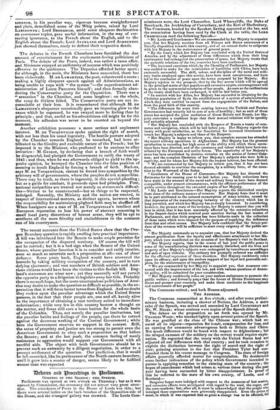The debates in the French Chambers have furnished the due
amount of entertainment for the excitement-loving politicians of Paris. The debate of the Peers, indeed, was rather a tame affair, and Ministers enjoyed an uniformity of success which was positively offensive to the quidnuncs. The Deputies afforded better sport ; for although, in the main, the Ministers have succeeded, there has been vicissitude. M. ros LAMARTINE, the poet, volunteered a scene ; making a highly eloquent speech against all Administrations, as being unable to cope with " the system "—the superdominant ad- ministration of Loots PHILIPPE himself; and then formally aban- doning the Conservative party for the Opposition. There was a " sensation" in the Chamber, and some laughter : on the whole, the coup de theatre failed. The Conservative party are not in- consolable at their loss. It is remembered that although M. DE lasseurnss's eloquence occasionally gave an imposing glow to the cause which he espoused, he was swayed more b feeling than by principle ; and that, useful as his adventitious aid might be for the moment, his adhesion was never to be counted on beyond the moment.
Another exhibition possesses a more serious and unpleasant interest. M. DE TOCQUEVILLE spoke against the right of search, with not less than his usual ingenuity. The hostile posture adopted by the Chamber towards England, he remarked, had been at- tributed to the frivolity and excitable nature of the French; but he imputed it to the Minister, who professed to be anxious to allay irritation : M. GUIZOT, by declaring that a breach of faith would be disgraceful, had pledged the Government to ratify the treaty of 1841; and thus, when he was afterwards obliged to yield to the op- posite opinion, he betrayed the Chamber into the false position of seeming to insult England by forcing a breach of faith. Nations, says M. Ds TOCQUEVILLE, cannot be forced into sympathies by the arbitrary will of governments, where the peoples do not s3rnpathize. There may be truth, as there is ingenuity, in this special-pleading ; but as a guide for conduct, it proceeds upon bad principles. First, national antipathies are treated not merely as statesmen's difficul- ties—friction to be counteracted—but as things to be respected, indulged. Secondly, the Ministry and the nation are treated, in respect of international matters, as distinct agents, between whom the responsibility for maintaining plighted faith may be shuffled off. When foreigners see a man of M. nu ToctausviLLE's intellect and European reputation so lose his power of abstract reasoning in small local party distortions of honest sense, they will be apt to attribute all the more frivolity and excitableness to the common ran of his countrymen.


























 Previous page
Previous page